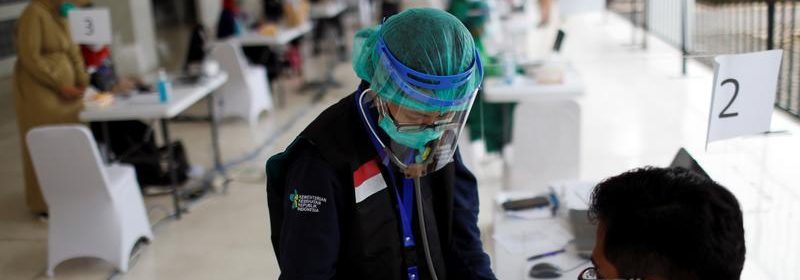Indonesia permits private COVID-19 vaccination scheme

JAKARTA (Reuters) – Indonesia has authorised one of the world’s first private vaccination schemes to run alongside its national programme so that companies can buy state-procured vaccines to inoculate their staff in Southeast Asia’s biggest country.
The initiative, approved by a government regulation, has drawn criticism from some health experts who warn it could worsen inequity.
The world’s fourth most populous country has launched an ambitious programme to vaccinate 181.5 million people for free in about a year, but business had been pushing for a way of inoculating staff faster to open up the economy.
The regulation stipulates that companies can buy vaccines and inoculate staff and their families for free at privately-run health centres with vaccines distributed by state-owned pharmaceutical company Bio Farma.
The vaccines in the scheme must differ from the current rollout, which includes China’s Sinovac Biotech and is slated to include the AstraZeneca and Novavax vaccines.
“The scheme cannot disturb the rollout currently done by the government,” Siti Nadia Tarmizi, a senior health ministry official, told a news conference on Friday, adding there were still preparations to be made before it could start.
A Bio Farma official told the news conference that it was in talks with Moderna Inc on securing vaccines for the private scheme, a day after a minister said two million doses of China’s Sinopharm vaccine had been lined up.
Vaccines for both programmes require an approval for emergency use issued by the country’s food and drug agency.
A minister said this week that more than 6,600 companies had signed up for the private scheme.
Jahja Setiaatmadja, president director of Bank Central Asia, Indonesia’s biggest bank by market value, told Reuters the lender would like to secure up to 70,000 doses.
The price ceiling for vaccines will be decided by the health minister, the regulation said.
Olivia Herlinda, policy director at the Center for Indonesia’s Strategic Development Initiative, a public health NGO, said the scheme could risk corruption and commercialisation and came as vaccines remained scarce.
“Private vaccination risks missing the target and opening an imbalance of access of vaccines for some groups,” she said.
The government has denied risks of commercialisation and said it would work with the country’s anti-graft agency during the operation’s rollout.
Source: Read Full Article